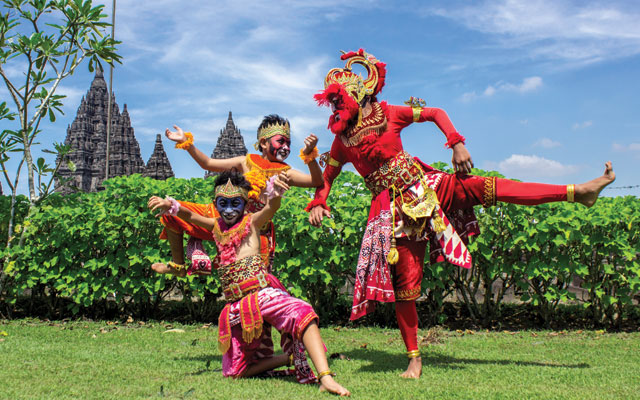Yogyakarta’s rich heritage, diverse ancient sites and unique venues are injecting more flavour into corporate programmes.
Yogyakarta may not have large convention facilities to boast of like her more popular sister MICE cities, but her heritage and culture have proven to be formidable lures for corporate event planners in search of memorable destination experiences.

I Gusti Putu Yaktianuraga (Bagus), managing director of Werkudara Nirwana Sakti, a major event and travel management company in Yogyakarta, told TTGmice: “People may only know of Borobudur and Prambanan, but there are actually 52 temples in and around Yogyakarta and Central Java. These are our strong assets. Heritage and culture are our competitive edge in courting business events. Therefore, all our events feature local content built on Javanese cultural values and wisdom.”
Three of Yogyakarta’s most popular heritage sites are business event-friendly. Prambanan, Borobudur and Ratu Boko Palace have a combined collection of 19 event venues, ranging from a 60-seat indoor space to a sprawling outdoor area for up to 10,000 people at a standing cocktail reception.
Some of these venues have been utilised for public events. The Prambanan Temple Gardens, for example, hosts the annual Prambanan Jazz Festival which has featured international music greats like Shakatak, Shane Filan and Diana Krall.
Roswita, head of events division, Taman Wisata Candi Borobudur, Prambanan and Ratu Boko Management, noted that there are even more spaces around the temples which are suitable for small and medium-sized gatherings.
As well, there has been a recent rise in efforts to promote the smaller and less-known temples in the destination for corporate activities.
For instance, corporate teambuilding groups could start the day with breakfast at Candi Sambisari, a Hindu temple in Kalasan, followed by a bicycle trail along small villages to Candi Plaosan in Bugisan near Prambanan. Stops at a tofu or tempeh cracker factory could offer CSR opportunities.
Another option which would suit a corporate incentive programme is a visit to Candi Banyunibo followed by a sunset dinner at the nearby Ratu Boko Palace.
The only downside to using smaller temples is space limitations.
To resolve this, Werkudara Nirwana Sakti ropes in the local community for support. Around Candi Plaosan and Candi Banyunibo, for example, are open spaces belonging to the local community.
“We’d hire the space, set up tables, lighting and stage, and use the temple as backdrop. We’d involve the locals by having them to prepare drinks such as coconut juice (from coconut harvested from their trees) and home-cooked favourites such as soto (soup) and pecel (salad),” said Bagus.
Events planned at Candi Banyunibo could utilise an area for traditional archery managed by the locals.
Such community involvement helps sustain the livelihood of the locals. For example, renovation and promotion of Sojiwan Temple have transformed the area into a tourism village over the last couple of years.
Warjono, board member of the tourism village, said: “When the government started renovating Sojiwan Temple in 2004, we formed a tourism awareness group to identify our potential. We now have andong horse carts and gerobak ox carts to provide visitors with traditional transport, bicycles for rent, and local delicacies produced in home industries.”
UNESCO assistance in 2015, followed by support from the local government and universities, encouraged the local batik industry to thrive. Local designs depicting reliefs from Sojiwan Temple are a hit now.
Today, the village is capable of hosting a corporate dining event for up to 200 delegates at its Pendopo Hall, with entertainment provided by locals who play the gamelan and meals cooked to strict standards by local families.
Beyond temples, Yogyakarta dangles a plethora of other heritage sites that make interesting additions to corporate programmes.
The labyrinth of small lanes inside Kotagede, the capital of Mataram Sultanate in the 16th century, is perfect for Amazing Race-type teambuilding games which give participants a valuable history lesson.
There are also a number of traditional houses with joglo halls that are open for lunch and dinner.
Shinta Noor Kumala, coordinator of the Kotagede Heritage Trail, said: “When house owners realise that their homes are admired by foreigners for their traditional architecture and heritage value, they would want to keep and preserve their houses. This is one way we help to conserve Kotagede and our home, and empower our people.”
Yogyakarta’s unique venue options extend to museums such as Sonobudoyo and Affandi Museum, traditional markets such as Pasar Ngasem, and more.
Yurry Apreto, director of GM Production Indonesia, said meetings in Yogyakarta need not be saturated with cultural activities in order to offer a sense of place. It could be as simple as sitting on the floor to meet in lesehan-style.
To further develop the destination for business events, industry players hope the regional government will continue to develop new products, improve facilities and infrastructure, and step up promotions.
Yurry said: “We are facing competition from (other Indonesian cities like) Belitung and Mandalika, and need to keep attracting new and returning business events.”





















